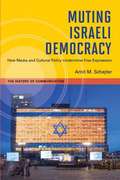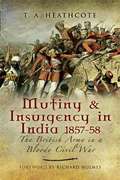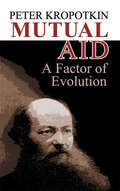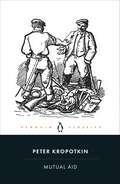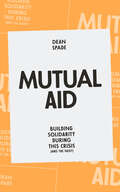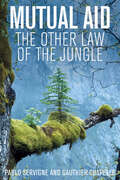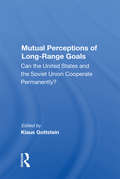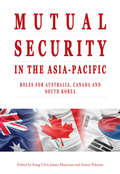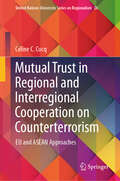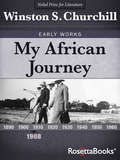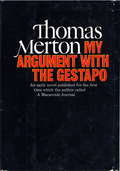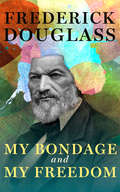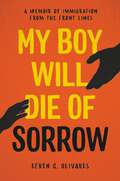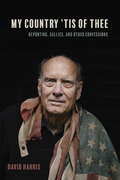- Table View
- List View
Muting Israeli Democracy: How Media and Cultural Policy Undermine Free Expression
by Amit M. SchejterThe result of years of critical analysis of Israeli media law, this book argues that the laws governing Israeli electronic media are structured to limit the boundaries of public discourse. Amit M. Schejter posits the theory of a "mute democracy," one in which the media are designed to provide a platform for some voices to be heard over others. While Israel's institutions may be democratic, and while the effect of these policies may be limited, this book contends that free speech in Israel is institutionally muted to ensure the continued domination of the Jewish majority and its preferred interpretation of what Israel means as a Jewish-democratic state. Analyzing a wide range of legal documents recorded in Israel from 1961 to 2007, Muting Israeli Democracy demonstrates in scrupulous detail how law and policy are used to promote the hegemonic national culture through the constraints and obligations set on electronic media.
Mutiny & Insurgency in India, 1857–58: The British Army in a Bloody Civil War
by T. A. HeathcoteA vivid account of the bloody rebellion against colonial rule that raged through Northern India in the mid-nineteenth century. In 1857, a mutiny against the British East India Company broke out in the Bengal Army that would soon spread to Delhi and beyond. The cycle of bloody reprisals would continue for a little over two years, leaving countless bodies in its wake. The events of 1857 to 1859 were tragic and momentous. The challenge to British colonial rule was on an unprecedented scale. This book places these grim events into their historical, political, and economic contexts, and the authors&’ use of sources including personal accounts brings events of over a century and a half ago vividly to life.
Mutiny & Insurgency in India, 1857–58: The British Army in a Bloody Civil War
by T. A. HeathcoteA vivid account of the bloody rebellion against colonial rule that raged through Northern India in the mid-nineteenth century. In 1857, a mutiny against the British East India Company broke out in the Bengal Army that would soon spread to Delhi and beyond. The cycle of bloody reprisals would continue for a little over two years, leaving countless bodies in its wake. The events of 1857 to 1859 were tragic and momentous. The challenge to British colonial rule was on an unprecedented scale. This book places these grim events into their historical, political, and economic contexts, and the authors&’ use of sources including personal accounts brings events of over a century and a half ago vividly to life.
Mutual Accompaniment as Faith-Filled Living: Recognition of the Vulnerable Other
by Gerard J. RyanIn this book, Gerard J. Ryan examines the interrelationship between recognition theory and theology with their respective concerns for what it means to be a human. He advocates a mutual accompaniment that reformulates recognition theory within a practical and public theology. Ryan develops this interpersonal recognition through the accompaniment of vulnerable people, particularly persons with disabilities and those who suffer from mental illness. He explores three contexts that support this mutual accompaniment and the labour of recognition. These are narrativity, the stories we live out of; vulnerability, the basic human condition common to all; and participation, the inter-relationship of humanity.
Mutual Aid: A Factor of Evolution
by Peter KropotkinIn this cornerstone of modern liberal social theory, Peter Kropotkin states that the most effective human and animal communities are essentially cooperative, rather than competitive. Kropotkin based this classic on his observations of natural phenomena and history, forming a work of stunning and well-reasoned scholarship. Essential to the understanding of human evolution as well as social organization, it offers a powerful counterpoint to the tenets of Social Darwinism. It also cites persuasive evidence of human nature's innate compatibility with anarchist society."Kropotkin's basic argument is correct," noted evolutionary biologist Stephen Jay Gould. "Struggle does occur in many modes, and some lead to cooperation among members of a species as the best pathway to advantage for individuals." Anthropologist Ashley Montagu declared that "Mutual Aid will never be any more out of date than will the Declaration of Independence. New facts may increasingly become available, but we can already see that they will serve largely to support Kropotkin's conclusion that 'in the ethical progress of man, mutual support—not mutual struggle—has had the leading part.'" Physician and author Alex Comfort asserted that "Kropotkin profoundly influenced human biology by his theory of Mutual Aid. . . . He was one of the first systematic students of animal communities, and may be regarded as the founder of modern social ecology."
Mutual Aid: A Factor of Evolution
by Peter KropotkinA pioneering treatise on cooperation and reciprocity, from the great anarchist thinker'Don't compete! - competition is always injurious to the species, and you have plenty of resources to avoid it!'In his pioneering 1902 treatise on human cooperation, the anarchist thinker and natural scientist Peter Kropotkin argued that it is our innate instinct for mutual aid - rather than mutual struggle - which enables societies to survive and flourish. From the earliest days of evolution through to medieval guilds, indigenous nomads and modern voluntary organisations, Kropotkin's vision of small-scale, ecologically sustainable, collective communities challenged the orthodoxies of his age, whether individualism or Marxism. Mutual Aid offers instead a radical, and prescient, rewriting of the whole of human history.With an introduction by David Priestland
Mutual Aid: Building Solidarity During This Crisis (and the Next)
by Dean SpadeMutual aid is the radical act of caring for each other while working to change the world. Around the globe, people are faced with a spiralling succession of crises, from the Covid-19 pandemic and climate change-induced fires, floods, and storms to the ongoing horrors of mass incarceration, racist policing, brutal immigration enforcement, endemic gender violence, and severe wealth inequality. As governments fail to respond to—or actively engineer—each crisis, ordinary people are finding bold and innovative ways to share resources and support the vulnerable. Survival work, when done alongside social movement demands for transformative change, is called mutual aid.This book is about mutual aid: why it is so important, what it looks like, and how to do it. It provides a grassroots theory of mutual aid, describes how mutual aid is a crucial part of powerful movements for social justice, and offers concrete tools for organizing, such as how to work in groups, how to foster a collective decision-making process, how to prevent and address conflict, and how to deal with burnout. Writing for those new to activism as well as those who have been in social movements for a long time, Dean Spade draws on years of organizing to offer a radical vision of community mobilization, social transformation, compassionate activism, and solidarity.
Mutual Aid: The Other Law of the Jungle
by Pablo Servigne Gauthier ChapelleIn the merciless arena of life, we are all subject to the law of the jungle, to ruthless competition and the survival of the fittest – such is the myth that has given rise to a society that has become toxic for our planet and for our and future generations. But today the lines are shifting. A growing number of new movements and thinkers are challenging this skewed view of the world and reviving words such as ‘altruism’, ‘cooperation’, ‘kindness’ and ‘solidarity’. A close look at the wide spectrum of living beings reveals that, at all times and in all places, animals, plants, microorganisms and human beings have practised different forms of mutual aid. And those which survive difficult conditions best are not necessarily the strongest, but those which help each other the most. Pablo Servigne and Gauthier Chapelle explore a vast, forgotten continent of mutual aid in order to discover the mechanisms of this ‘other law of the jungle’. In so doing, they provide a more rounded view of the world of living things and give us some of the conceptual tools we need to move beyond the vicious circle of competition and self-destruction that is leading our civilization to the verge of collapse.
Mutual Perceptions Of Long-range Goals: Can The United States And The Soviet Union Cooperate Permanently?
by Klaus GottsteinThis book investigates perceptions—including strategic, normative and imagined perceptions—of long-range political goals both in the East and in the West, discussing the arguments which are used to support each of these perceptions.
Mutual Security in the Asia-Pacific: Roles for Australia, Canada and South Korea
by Kang Choi James Manicom Simon PalamarMyriad challenges to regional stability and security threaten East Asia's burgeoning growth and prosperity. Mutual Security in the Asia-Pacific: Roles for Australia, Canada and South Korea addresses the economic and security challenges that loom in the region and the role that these three countries can play to ensure a stable, predictable political environment.
Mutual Security in the Asia-Pacific: Roles for Australia, Canada and South Korea
Myriad challenges to regional stability and security threaten East Asia’s burgeoning growth and prosperity. Mutual Security in the Asia-Pacific: Roles for Australia, Canada and South Korea addresses the economic and security challenges that loom in the region and the role that these three countries can play to ensure a stable, predictable political environment.
Mutual Trust in Regional and Interregional Cooperation on Counterterrorism: EU and ASEAN Approaches (United Nations University Series on Regionalism #26)
by Céline C. CocqThis book provides a detailed theoretical and practical analysis of a key concept in cooperation, namely mutual trust, in the EU and ASEAN regions. It particularly looks at the issue of counterterrorism. It analyses the differences in the legalistic approach of the EU and the consultation and consensus-based approach in the ASEAN region, and the correlation between mutual trust and regional and interregional cooperation against terrorism. Thereby, this book extends the well-known concept of counterterrorism in EU criminal law to another regional case in order to analyse its possible use and operationalisation in other regions. It provides important findings on whether and, if so, how the EU and ASEAN legal frameworks have facilitated intra-regional – and potentially interregional – cooperation. In order to measure trust, it focuses on information sharing, and discusses the terminology related to this matter, the mechanisms of cooperation, and the difficulties and successes of information sharing. This book is of great interest for academics doing research on trust, transnational cooperation, regional counterterrorism legal architecture in the EU and ASEAN, and comparative legal regional and interregional analysis, and officials and practitioners involved in transnational cooperation in criminal matters, especially terrorism.
Muzzled: From T-Ball to Terrorism--True Stories That Should Be Fiction
by Michael SmerconishSick of the total BS of rampant PC? This brazen, furiously funny book is the antidote to today's poison of political correctness. With humor and chutzpah, attorney, commentator, and popular radio host Michael Smerconish takes on today's oversensitive culture with a collection of entertaining, outlandish anecdotes about PC gone wild-stories that are hilarious, horrifying, and unbelievably true. Why are sports leagues handing out trophies to losers? Why are little old grandmas hired to guard 200-pound prisoners? Why are newborn babies and old men with walkers singled out at the airport while likely terrorists are ushered through security with ease? This book shows through these absurdities that today's atmosphere of censorship and multiculturalism is paving the way for serious threats to our cultural identity and national security: "It's one thing for the forces of political correctness to muzzle our day-to-day lives here at home in the US, quite another when that same cancer metastasizes into the war on terror." We must eradicate the PC disease. Our sanity-and our very lives-depend on it. "Michael Smerconish talks the talk: If you say unpopular things, watch out! Using vivid examples of PC rubbish, Muzzled will lead you into a world that would terrify Rod Serling. An entertaining and provocative book." -Bill O'Reilly "Reads like fiction, too bad it's true." -Nelson DeMille, novelist, author of Night Fall and The General's Daughter "The PC virus is out of control . . . and it's worse than you think! In this entertaining and important book, Michael Smerconish chronicles just how mindless things have gotten in politically correct America. He tells fascinating stories that will make you laugh . . . right up until the time they make you scream. Thanks to the PC crowd, we are all living in The United States of the Absurd." -Bernard Goldberg, journalist and author of 100 People Who Are Screwing Up America, Arrogance, and Bias "I really squirm whenever I find myself agreeing with Smerconish. (I know the feeling is mutual.) I did a lot of squirming while reading this provocative book. All true liberals and conservatives must agree with Smerconish that the PC muzzles must be removed so that people can decide based on the marketplace of ideas." -Alan Dershowitz, Felix Frankfurter Professor of Law, Harvard and author of Preemption "I don't often find myself on the same side of the political barricades as Michael Smerconish. But Muzzled is a witty, provocative, and timely book. Even when Michael is wrong, which is often, he draws you in and keeps you reading." -Arianna Huffington, author of Pigs at the Trough and Fanatics and Fools "In Muzzled, my American Blood Brother of status-quo-obliterating defiance, Michael Smerconish, once again smokes out the cockroaches of political correctness . . . Muzzled is a great title for a book that I am convinced every American school kid should read and be tested on. If a new generation doesn't grow some intellectual balls, our Once Great Nation will continue to repeat horrific mistakes and pay the price . . . Read it. Live it." -Ted Nugent, rock star, author, television personality, and hunter extraordinaire
My (Our) President Has Balls!: An Examination of the Cultural Divide in America Today
by Frank MascettiMy (Our) President Has Balls takes a deep look at the cultural divide in America today, breaking down that divide into nearly twenty categories and encouraging readers to do their part to fix what’s been broken. While there have been countless books released by politicians, past presidents, news personnel, and Washington insiders, Frank Mascetti addresses America’s cultural divide as an extremely passionate “outsider” who is raising two minors. Expressing concern about where America is headed as a nation and what is being left behind for future generations, Mascetti breaks down America’s great divide into specific categories with which readers immediately can identify. These categories include things like The Trump Complex, What American Doesn’t Want These Things, Political Incorrectness, Inside the Mind of a Hater, and so many more. Rather than placing blame on past administrations, Mascetti takes a hard look at America’s overall culture today—from schools to teachers to social media—and how many aspects are in desperate need of a makeover. Whether readers are Democrats, Republican, or Independent, My (Our) President Has Balls is sure to enlighten and provide fresh perspective on the State of the Union, encouraging all Americans to start thinking about how political opposites can meet in the middle and begin to pull America out of crisis mode.
My African Journey (Winston S. Churchill Early Works)
by Winston S. ChurchillThe future Prime Minister recounts his excursions through colonial East Africa in this 1908 travelogue complete with maps and photographs. In the early years of the 20th Century, Winston Churchill served as Undersecretary of State for the British Colonies. During this time, he lobbied for permission to tour and inspect Britain's holdings in East Africa. In My African Journey, Churchill provides a detailed chronicle of his trip, documenting his experiences, the people he met, and his thoughts on how Britain might best wield its power in the region. Detailing his experiences on the Uganda Railway, around Mount Kenya, and beyond, Churchill&’s journal is a fascinating travel narrative. It is also a significant historical document, providing a firsthand account of Churchill&’s views on colonialism in the early 20th century.
My America
by Hugh Downs"Some of these essays are powerful and poetic. Some seem to reflect a stunned condition on the part of the contributor. But all of them share a newborn or reawakened feeling about the country we live in -- an underlying concern for it, whether that concern is rooted in anger and fear, or in a sensed and urgent need for action, or internal correction, or wagon-circling. Some are personal narratives that explain and justify the patriotism of the writer. Some examine and praise the values that make the country great." -- Hugh Downs, from the Introduction What is the essence of America? In this fascinating new collection inspired by one of our most trusted and beloved commentators, 150 diverse Americans -- from top politicians and entertainers to firefighters and teachers -- express in their own words what America means to them. My America includes candid insights from television journalists such as Mike Wallace and Barbara Walters; politicians including former president George Bush and John Glenn; writers such as Walter Anderson and Anita Diamant; and entertainers, among them Dave Brubeck and Patricia Neal; as well as lesser-known citizens from all over the country. These frank and thought-provoking observations from Americans of every age, race, religion, and social position compellingly illustrate the American mosaic and offer a glimpse into the subconscious mind of this unique and wonderful nation. This touching volume, celebrating the similarities and the differences of a people, reflects our core values and is sure to inspire pride in America. Edited and with an introduction and an epilogue by Hugh Downs -- who coanchored ABC's 20/20, hosted NBC's Today show, and has been an important American voice for more than half a century -- My America explores the values, ideals, and dreams that all Americans share. At a time when people are reassessing their patriotism and rediscovering their national allegiance, emotions regarding the United States are stronger and more poignant than they have been in years, and this sentiment has been captured in these pages. My America is a timely collection for anyone who wants to reflect on America's past, or celebrate its future.
My American Life
by Congresswoman Lauren BoebertHow Lauren Boebert, the gun-toting Congresswoman from Rifle, Colorado, joined the fight to make sure we never live in a socialist country.Lauren Boebert is the Republican, gun-toting Congresswoman from Rifle, Colorado who overcame difficult life circumstances to be a leading voice for personal freedom and our 2nd Amendment rights. Raised on welfare in a Democrat household, young Lauren learned from her first job at McDonald&’s that she could provide for herself better than the government ever could. She gained national attention after wearing a Glock on her hip and telling Democrat presidential candidate Beto O&’Rourke, &“Hell no, you aren&’t taking our guns.&” A self-taught conservative and small business owner, Lauren Boebert&’s My American Life describes in vivid detail why Lauren dropped out of high school, the success of Shooters Grill (where her restaurant staff open-carries live firearms), and how she came to be a United States Congresswoman making sure her four boys never grow up in a socialist country. Lauren Boebert is a true believer in the opportunity of an America based on the beliefs in God, family, and country, where a one-hundred-pound, five-foot-nothing mom who had never been elected to public office suddenly had the opportunity, in Congress, to stand up for our core conservative beliefs and call Nancy Pelosi, AOC, and the rest of the crazy liberals out on all their bullcrap.
My Autobiography: With "The Political and Social Doctrine of Fascism"
by Benito MussoliniUrged by American Ambassador to Rome Richard Washburn Child to write his autobiography, Benito Mussolini hesitated only slightly before he dictated thoughts on his private and public life. This volume reprints the Italian dictator's extraordinary comments, capturing the spirit and personality of Il Duce as no other book does. Included are Mussolini's views on Italian politics, descriptions of his years as an agitator, journalist, and soldier, the formation of the Fascist Party, the "March on Rome," and his early years in power. The text also contains some of his most famous speeches in the Italian Parliament, his vision of Italy's return to glory, and his definitive statement on the doctrine of Fascism and its political justification.Essential reading for students of history and political science, this frank, and frequently arrogant, revelation of the Italian leader's life produced mixed reactions when first published in 1928. "Like him or not," wrote the reviewer for the Saturday Review of Literature, "here he is, Mussolini the man, the patriot, the leader."
My Backyard Jungle: The Adventures of an Urban Wildlife Lover Who Turned His Yard into Habitat and Learned to Live with It
by James BarillaFor James Barilla and his family, the dream of transforming their Columbia, South Carolina, backyard into a haven for wildlife evoked images of kids catching grasshoppers by day and fireflies at night, of digging up potatoes and picking strawberries. When they signed up with the National Wildlife Federation to certify their yard as a wildlife habitat, it felt like pushing back, in however small a way, against the tide of bad news about vanishing species, changing climate, dying coral reefs. Then the animals started to arrive, and Barilla soon discovered the complexities (and possible mayhem) of merging human with animal habitats. What are the limits of coexistence, he wondered? To find out, Barilla set out across continents to explore cities where populations of bears, monkeys, marmosets, and honeybees live alongside human residents. My Backyard Jungle brings these unique stories together, making Barillaâ TMs yard the centerpiece of a meditation on possibilities for coexistence with animals in an increasingly urban world. Not since Gerald Durrell penned My Family and Other Animals have readers encountered a naturalist with such a gift for storytelling and such an open heart toward all things wild.
My Bondage and My Freedom: The Givens Collection (Tale Blazers: American Literature Series)
by Frederick DouglassA deep meditation on the implications of slavery, race, and freedom, as well as a study of one man's perspective and how he intersects with the nation in which he lives, My Bondage and My Freedom is a powerful look at pre-Civil Wars America. Frederick Douglass—abolitionist, journalist, orator, and one of the most powerful voices to emerge from the American civil rights movement—transforms himself from slave to fugitive to reformer, leaving behind a legacy of social, intellectual, and political thought. Penguin Random House Canada is proud to bring you classic works of literature in e-book form, with the highest quality production values. Find more today and rediscover books you never knew you loved.
My Boy Will Die of Sorrow: A Memoir of Immigration From the Front Lines
by Efrén C. OlivaresINTERNATIONAL LATINO BOOK AWARD WINNER - The Raul Yzaguirre Best Political/Current Affairs Book This deeply personal perspective from a human rights lawyer—whose work on the front lines of the fight against family separations in South Texas intertwines with his own story of immigrating to the United States at thirteen—reframes the United States' history as a nation of immigrants but also a nation against immigrants. In the summer of 2018, Efrén C. Olivares found himself representing hundreds of immigrant families when Zero Tolerance separated thousands of children from their parents at the U.S.-Mexico border. Twenty-five years earlier, he had been separated from his own father for several years when he migrated to the U.S. to work. Their family was eventually reunited in Texas, where Efrén and his brother went to high school and learned a new language and culture. By sharing these gripping family separation stories alongside his own, Olivares gives voice to immigrants who have been punished and silenced for seeking safety and opportunity. Through him we meet Mario and his daughter Oralia, Viviana and her son Sandro, Patricia and her son Alessandro, and many others. We see how the principles that ostensibly bind the U.S. together fall apart at its borders.My Boy Will Die of Sorrow reflects on the immigrant experience then and now, on what separations do to families, and how the act of separation itself adds another layer to the immigrant identity. Our concern for fellow human beings who live at the margins of our society—at the border, literally and figuratively—is shaped by how we view ourselves in relation both to our fellow citizens and to immigrants. He discusses not only law and immigration policy in accessible terms, but also makes the case for how this hostility is nothing new: children were put in cages when coming through Ellis Island, and Japanese Americans were forcibly separated from their families and interned during WWII. By examining his personal story and the stories of the families he represents side by side, Olivares meaningfully engages readers with their assumptions about what nationhood means in America and challenges us to question our own empathy and compassion.
My Brother's Keeper: Netanyahu, Obama, & the Year of Terror & Conflict that Changed the Middle East Forever
by Ari Harow&“A useful aid to understanding today&’s headlines as well as Israel&’s recent past.&” –Kirkus Review My Brother&’s Keeper tells the behind-the-scenes story of how the American President and the Israeli Prime Minister clashed about peace, war, and the future of the region.Barack Obama and Benjamin Netanyahu viewed the world—and especially the Middle East—differently. The US president wanted to end what he saw as America&’s perpetual war against the Muslim and Arab worlds, use diplomacy to bring about a Palestinian state coexisting peacefully with Israel, and apply his signature foreign policy vision to reward the Islamic Republic of Iran in exchange for the scaling back of their nuclear pursuits. The Israeli premier wanted his country to thrive without the senseless bloodshed of terror and violence, and he was determined to protect the Jewish state from threats of annihilation by a member of the axis of evil that would one day be armed with nuclear weapons. Netanyahu wanted peace for peace, as well as the acceptance of Israel as a full-fledged part of the Middle East. In 2014, during a pivotal summer of terrorist violence, a war in Gaza, and the advancement of a nuclear deal with Iran, the two men clashed, threatening the US-Israeli strategic alliance and the future of the region. The Middle East would never be the same.
My Car in Managua
by Forrest D. ColburnHistories of revolutions often focus on military, political, or economic upheavals but sometimes neglect to connect these larger events to the daily lives of "ordinary" people. Yet the peoples' perception that "things are worse than before" can topple revolutionary governments, as shown by the recent defeat of the Sandinista regime in Nicaragua and the governments of Eastern Europe. Providing the kind of prosaic, revealing details that more formal histories have excluded, My Car in Managua offers an objective, often humorous description of the great difficulties and occasional pleasures of life in Nicaragua during the Sandinista revolution. During a year's work (1985-1986) at the Instituto Centroamericano de Administración de Empresas (INCAE), Forrest Colburn purchased a dilapidated car-and with it an introduction to everyday life in Nicaragua. His discoveries of the length of time required to register the car (approximately six weeks), the impossibility of finding spare parts (except when U. S. dollars were applied to the search), and the fact that "anyone getting into a car in Managua can be charged a small fee [for car watching] by anyone else" all suggest the difficulties most Nicaraguans faced living in a devastated economy. Drawing on experiences from visits throughout the revolutionary period (1979-1989), Colburn also sheds light on how the Revolution affected social customs and language, gender roles and family relationships, equality and authority, the availability of goods and services, the status of ethnic minorities, and governmental and other institutions. Illustrations by Nicaragua's celebrated political cartoonist Róger Sánchez Flores enliven the lucid text.
My Country 'Tis of Thee: Reporting, Sallies, and Other Confessions
by David HarrisDavid Harris is a reporter, a clear-eyed idealist, an American dissident, and, as these selected pieces reveal, a writer of great character and empathy. Harris gained national recognition as an undergraduate for his opposition to the Vietnam War and was imprisoned for two years when he refused to comply with the draft. His writings trace a bright throughline of care for and attention to outsiders, the downtrodden, and those who demand change, and these eighteen pieces of long-form journalism, essays, and opinion writings remain startlingly relevant to the world we face today. This career-spanning collection of writings by an always-independent journalist follow Harris from his early days as a prominent leader of the resistance to the Vietnam War, through regular contributions to many publications, including Rolling Stone and the New York Times, and on into the twenty-first century.Born in Fresno and elected student body president of Stanford University in 1966, Harris has always had an undeniably Californian point of view—he imagines the future with an open heart and mind and pursues stories out of genuine curiosity, embedding himself among striking farmworkers, marijuana growers, the homeless on LA’s skid row, and occasionally, redwood trees. Inspiring, clarifying, and fearless, his abiding and lucid patriotism insists that our country live up to its own ideals.
